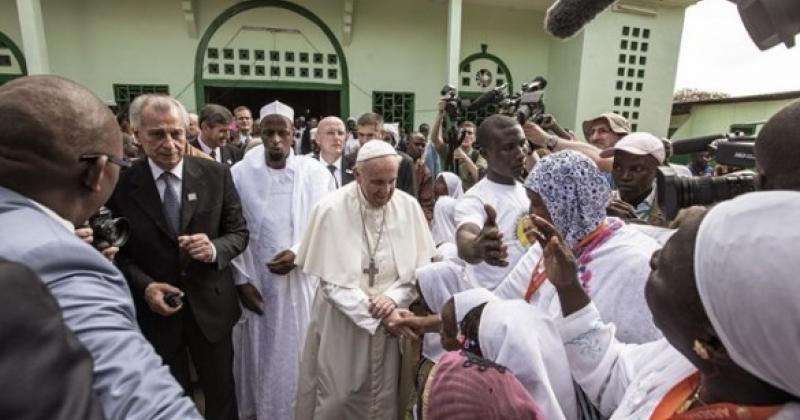Francis met the Muslim community in the KM5 neighbourhood.
Few believed he was going to make it. But Pope Francis did it. He entered the central mosque in Koudoukou, in Bangui, in the “ill-famed ‘KM5’” neighbourhood, where a line divides the majority Muslim section from the area where the Christians live. It is a dangerous zone and a symbol of the tensions caused by CAR’s civil war. In this very place, the Pope emphasised that: “Christians and Muslims are brothers and sisters.” “They ought, therefore, to remain united in working for an end to every act which, from whatever side, disfigures the Face of God and whose ultimate aim is to defend particular interests by any and all means, to the detriment of the common good.” And he sent out an appeal: “Together, we must say no to hatred, to revenge and to violence, particularly that violence which is perpetrated in the name of a religion or of God himself.”
The Pope was greeted by the Imam of the mosque, Tidiani Moussa Naibi, who said: “The people of CAR are not condemned to conflict and violence. The current situation in our country will not go on forever. It is simply a moment in our history. A painful moment, certainly, an unfortunate moment, but just a moment. And soon, very soon, we will find again the peace and security we once had.”
Addressing Muslims as “dear brothers and sisters”, Pope Francis said: “It is a great joy for me to be with you and I thank you for your warm welcome. In a particular way I thank Imam Tidiani Moussa Naibi for his kind words of greeting. My Pastoral Visit to the Central African Republic would not be complete if it did not include this encounter with the Muslim community.”
He then went straight to the heart of the issue: relations between the two religions: “Christians and Muslims are brothers and sisters. We must therefore consider ourselves and conduct ourselves as such. We are well aware that the recent events and acts of violence which have shaken your country were not grounded in properly religious motives. Those who claim to believe in God must also be men and women of peace. Christians, Muslims and members of the traditional religions have lived together in peace for many years. They ought, therefore, to remain united in working for an end to every act which, from whatever side, disfigures the Face of God and whose ultimate aim is to defend particular interests by any and all means, to the detriment of the common good.”
Francis underlined that “in these dramatic times, Christian and Muslim leaders have sought to rise to the challenges of the moment. They have played an important role in re-establishing harmony and fraternity among all. I would like express my gratitude and appreciation for this.”
The Pope recalled the many acts of solidarity which Christians and Muslims have shown with regard to their fellow citizens of other religious confessions, by welcoming them and defending them during this latest crisis in your country, as well as in other parts of the world”.
Especially with CAR in mind, Francis said he hoped the “forthcoming national consultations will provide the country with leaders capable of bringing Central Africans together, thus becoming symbols of national unity rather than merely representatives of one or another faction.”
Francis strongly urged the Muslim community to make their “country a welcoming home for all its children, regardless of their ethnic origin, political affiliation or religious confession. The Central African Republic, situated in the heart of Africa, with the cooperation of all her sons and daughters, will then prove a stimulus in this regard to the entire continent. It will prove a positive influence and help extinguish the smouldering tensions which prevent Africans from benefitting from that development which they deserve and to which they have a right.”
He concluded by inviting his “dear friends” “to pray and work for reconciliation, fraternity and solidarity among all people, without forgetting those who have suffered the most as a result of recent events. May God bless you and protect you!”
When the Pope arrived at the mosque, he asked to be shown to the mihrab, the marble niche that faces Mecca, the focal point of devotion in a Muslim temple. Francis spent a few moments in silent prayer among settled refugees. The Imams gave Francis a plaque with the inscription of a verse from the Quran which reads: “If you come across certain people who are more open to love, they are those who call themselves Christians” (approximate translation, Ed.). After greeting various people at the mosque, the Pope boarded the open-topped Popemobile and went to visit some refugees that had gathered in some tents near the mosque and visited a school in Koudoukou, where Christian and Muslim children study together. Francis was surrounded by an atmosphere of warmth, excitement and joy.
